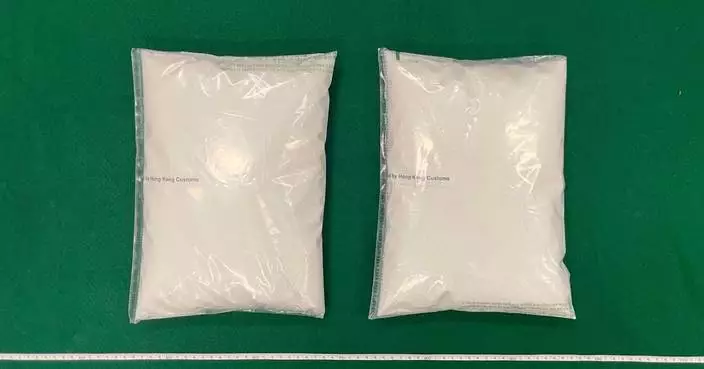HKMA and CBUAE deepen financial market co-operation between Hong Kong and UAE
The following is issued on behalf of the Hong Kong Monetary Authority:
The Hong Kong Monetary Authority (HKMA) and the Central Bank of the United Arab Emirates (CBUAE) held the second bilateral meeting in Hong Kong today (December 20), further solidifying co-operation and connectivity between the financial services sectors of the two jurisdictions.
Following the first bilateral meeting in Abu Dhabi in May 2023, the HKMA and the CBUAE have continued engaging in in-depth discussions covering several major areas, including cross-border debt capital market connectivity, financial infrastructure development, and investment outlook and opportunities in both the Middle East and North Africa (MENA) region and Mainland China.
In this connection, a Memorandum of Understanding (MOU) was signed today by the Chief Executive of the HKMA, Mr Eddie Yue,and the Governor of the CBUAE,H.E. Khaled Mohamed Balama, to strengthen and formalise the co-operation arrangements. Under the MOU, the two authorities have agreed to establish connectivity of the debt capital markets and the related financial market infrastructures between Hong Kong and the UAE with a view to facilitating cross-border debt securities issuance and investment activities.
Mr Yue said, "We are delighted to welcome the CBUAE delegation to Hong Kong. Today's discussions strengthened the financial collaboration between the two central banks in several important areas. The MOU, in particular, will further enhance mutual co-operation and the exchange of expertise between the HKMA and the CBUAE in debt capital markets, and reinforce Hong Kong's strategic role as a gateway to both the Renminbi and international debt markets. There is significant potential for the financial sectors of both sides to explore new business opportunities. We look forward to our continued collaboration with the CBUAE to strengthen investment and financial market connectivity between the Middle East and Asia."
H.E. Khaled Mohamed Balama said, "I am glad to see encouraging progress made today between the two central banks in agreeing on the way forward on debt capital market development and collaboration. We aim at unlocking the potential of the two debt capital markets to allow seamless and cost-effective cross-border debt securities issuance, trading, investment, settlement as well as collateral management. This initiative will help the UAE become the gateway for issuers and investors in the MENA region to have efficient access to the China and Asian debt markets, whilst also, allowing Chinese and Asian issuers and investors to gain direct access to the MENA debt market through the UAE."

HKMA and CBUAE deepen financial market co-operation between Hong Kong and UAE Source: HKSAR Government Press Releases

HKMA and CBUAE deepen financial market co-operation between Hong Kong and UAE Source: HKSAR Government Press Releases
CFS announces results of first report under Second Hong Kong Total Diet Study
The Centre for Food Safety (CFS) of the Food and Environmental Hygiene Department released the first report under the Second Hong Kong Total Diet Study today (December 20). This report examined the levels of sulphites in food and the associated dietary exposure. The findings showed that the Hong Kong population's dietary exposure to sulphites was well below the Acceptable Daily Intake (ADI) allocated for sulphites, indicating a low health concern.
The Second Hong Kong Total Diet Study aims to estimate the latest dietary exposure of the Hong Kong population and various population subgroups to some chemical substances of potential food safety concern, and in turn assess the associated health risks. The Study commenced in February 2023. A total of over 2 200 samples of over 180 food items were collected and prepared to the status in which the food could be normally consumed. The prepared samples were then pooled to form over 370 composite samples for laboratory analysis of various groups of chemical substances covering food additives, metallic contaminants, mycotoxins, persistent organic pollutants, pesticide residues and process contaminants, etc.
In this report, sulphites (including sulphur dioxide) refer to a group of multifunctional food additives, particularly as preservatives and antioxidants, which have a long history of use in food production.
A spokesman for the CFS said, "Acute toxicity of sulphites is low. However, chronic excessive exposure to sulphites was found to cause local irritation of the stomach and induce adverse effects on the central nervous system in experimental animals. Exposure to sulphites may lead to bronchoconstriction and other adverse reactions in certain population subgroups with allergic conditions."
The Joint Food and Agriculture Organization/World Health Organization Expert Committee on Food Additives allocated a group ADI of 0 to 0.7 milligram/kilogram body weight (bw) to sulphites.
Out of a total of 185 food items tested for sulphites, only 17 (about 9 per cent) were found to contain sulphites. Dried fruits were detected with the highest mean concentration of sulphites (240 mg/kg), followed by button mushrooms, red and white wine, and preserved vegetables, with a mean concentration of 20 to 30 mg/kg. The remaining food items with detectable levels of sulphites were found with a mean concentration of 10 mg/kg or below.
According to the findings, the estimated dietary exposure was 0.010 to 0.037 mg/kg bw/day and 0.021 to 0.055 mg/kg bw/day for average and high consumers of the adult population respectively, which accounted for 1.5 to 5.3 per cent and 3.0 to 7.9 per cent of the ADI allocated for sulphites. For the younger population (aged 6 to 17), the estimated dietary exposure was 0.012 to 0.051 mg/kg bw/day and 0.028 to 0.078 mg/kg bw/day for average and high consumers respectively, which accounted for 1.8 to 7.3 per cent and 3.9 to 11 per cent of the ADI.
The spokesman reminded members of the public to maintain a balanced diet to avoid excessive exposure to sulphites from a small range of food. When purchasing prepackaged food products, consumers can refer to the food labels to know whether the products contain sulphites. In particular, susceptible individuals who are sensitive to sulphites should avoid foods that contain sulphites by paying close attention to the food labels.
The Second Hong Kong Total Diet Study commenced in February 2023 and is expected to be completed by the end of 2026. The reports of other groups of chemical substances will be released in phases and uploaded to the CFS webpage at www.cfs.gov.hk.







